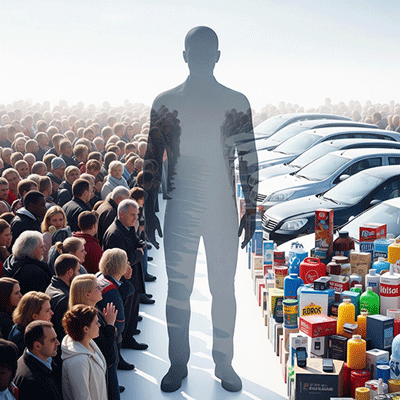AI double agents
AI double agents
With all the talk about Agentic AI, there’s an important question that people aren’t asking: who are these agents working for?
By Brad Berens
In last week’s column, I explored how Agentic AI will be bad for brands because, in a world where digital servants take over trivial everyday decisions, we human deciders will be less vulnerable to irrational advertising (e.g., buy the hot car, get the hot woman).
My friend Christopher Gales emailed me about this, and he has generously agreed to let me excerpt his note:
Here is my question about AI agents and the deterioration of brands: isn’t it likely that manufacturers will pay for AI agents to give them preferential treatment, the way they do with keyword search results and internet advertising now? For example, Proctor and Gamble will make a strategic deal with OpenAI to promote their products by default, thereby shifting the burden to consumers using the agents to specify the brands they want to seek or avoid. [snip] To me, this points to branded campaigns being built into AI agents.
Translation: Chris points out that my account of how Agentic AI might work around brands and buying habits is at a rainbows and unicorns level of optimism.

I created this image using Google Gemini.*
Yes, advertising is going to affect Agentic AI results because the different companies creating AI Agents are taking a page from Uber’s playbook and getting people accustomed to using AI all day, every day, before they figure out a sustainable revenue model.
Uber spent billions of dollars of venture capital putting its thumb on the scale: it subsidized rides below a break-even point to drive taxi companies out of business and bake in a ride-hailing habit before raising prices to basic taxi equivalence. Today, Uber is an advertising company that happens to provide rides and food delivery, but that’s a different column.
There are folks writing about how advertising and commerce are coming to AI. For example, I recommend John Ebbert’s excellent daily tipsheet.ai. In Business Insider, Lara O’Reilly’s recent “Perplexity AI’s plan for search ads looks nothing like Google” ($) piece was helpful, even if I do blanch at the thought of ads inside Perplexity. I can leave the ins and outs to others.
What Chris’s question prompted me to think about is a conundrum at the heart of the phrases “Agentic AI” and “AI Agents”—who do these agents work for? The phrases are, I think, ambiguous with intent. An AI Agent has agency because it can go out and do things in the world (I went into detail here) rather than just gather information.
On the other hand, typically when we talk about an agent or agency, we are talking about somebody who does something on behalf of another person. A real estate agent helps a buyer to get a house or a seller to sell one. Buyers and sellers each have their own agents to facilitate the deal, and when both buyer and seller use the same agent that agent has an inherent conflict of interest that is likely to blow up. (I speak from experience.)
Likewise, a talent agent should represent talent trying to get work (actors, writers, directors); the big agencies’ recent practice of bundling packages has worked against the interests of their clients, as Rebecca Giblin and Cory Doctorow explore in their excellent book Chokepoint Capitalism.
On the digital assistant side, Siri and Alexa don’t work for us, the human users: they work for Apple and Amazon. Likewise, the Google Assistant works for Google. In all cases, the assistants have goals that are not in the interests of the users: do everything in the Apple ecosystem even if there’s better hardware/software for a given task elsewhere; buy everything from Amazon even though there may be a better product or price elsewhere; turn to Google for all your information desires even though there may be higher quality information not buried in ads elsewhere.
AI Agents will follow the same path where helpful, always-on digital servants secretly advance the interests of advertisers and other business partners of the companies that create them.
These agents are double agents: they only seem to be working for us.
That means that users cannot trust their AI agents—unless we find a better model.
What might that better model look like?
It’s not pure subscription. Most users either aren’t willing to or can’t afford to pay $20 per month for the better versions of ChatGPT, Perplexity, Copilot, etc. Those versions are only a little bit better than the free ones. To get the much better versions you have to spend $200 per month, and to get the “hold on to your chair” versions you need to pay $2,000 per month. Even two grand probably doesn’t cover the cost of the model, the energy, etc.
For AI Agents, a hybrid subscription plus advertising model is possible, but it needs to be more like the old local newspaper model than the current, hyper-extractive, information asymmetrical versions of search, social media, and ecommerce.
In the old local newspaper model, there was an inescapable but productive tension between the editor in chief and the publisher. (This is also true of national papers and magazines.) The editor in chief was responsible for the product and to the readers. The publisher was responsible for the business and to the advertisers.
There are no editors-in-chief at Facebook, Amazon, or Google.
AI Agents should build in a similar but productive tension between earning the trust of the users and earning money from advertisers and other business partners.
Why the old local newspaper model? What I really mean is newspapers before CraigsList. When it comes to the death of hundreds of newspapers worldwide, CraigsList is the villain of the piece. (I don’t blame Craig; if he hadn’t done it somebody else would have.)
Before CraigsList, newspapers thrived on classified ads: the classifieds underwrote everything else the newspaper did, including local coverage, a DC bureau, and more.
One reason for optimism around AI Agents is that, at least at the moment, there’s lots of competition. Competition is good for a trustworthy user experience. If I find that ChatGPT tends to pay more attention to the interests of the advertisers than my interests, then I can switch to Copilot, or Claude, or some other agent. This is another way that emulating local newspapers would help Agents and human users. A few decades ago, most mid-sized to large cities had multiple newspapers, so readers could shop around. That hasn’t been the case for a while now.
AI Agents will follow the same path where helpful, always-on digital servants secretly advance the interests of advertisers and other business partners of the companies that create them. These agents are double agents: they only seem to be working for us. That means that users cannot trust their AI agents—unless we find a better model.
For AI Agents to succeed as products and businesses, they’ll need to do two big things:
1. Keep ads distinct from information that the Agent provides and actions that the agents take.
If I ask my agent to plan and book a weekend in Willamette Valley wine country for La Profesora and me, my agent should say, “Brad, I have paid offers from two wineries and three restaurants that will save you and Kathi money: would you like to learn about them?”
Information symmetry is the key to trust.
2. Invest in local information, advertising, commerce, and peer-to-peer interactions.
Newspapers hadn’t innovated classifieds in decades because they didn’t have to. Then CraigsList came, and it was too late. CraigsList hasn’t innovated in decades because it doesn’t have to.
Agentic AI + hyperlocal commerce + national commerce + local advertising + national advertising + peer-to-peer information exchange = something new and exciting.
I haven’t yet figured out how this model might reinvigorate local journalism, but I’m thinking. Perhaps the local newspapers could be responsible for aggregating adjacent and overlapping communities, leaving the technology side to the Agentic AI companies?
If you don’t think that local advertisers represent a whopping amount of cash, just look at Facebook. The reason the 2020 “Stop Hate for Profit” national brand boycott of Facebook failed was that Facebook makes a lot more money from 100,000 dry cleaners than one Unilever.
As I worked through all this, a question kept bubbling up: if I’m right and the Agentic AI plus hyperlocal combo platter is the best, then what mergers and acquisitions could we see in the future? Will Microsoft buy eBay? Will OpenAI buy Gannett? Will X.ai buy Sinclair?
To paraphrase Churchill, we’re not even at the middle of the beginning when it comes to AI. Stay tuned.
__________

Brad Berens is the Center’s strategic advisor and a senior research fellow. He is principal at Big Digital Idea Consulting. You can learn more about Brad at www.bradberens.com, follow him on Blue Sky and/or LinkedIn, and subscribe to his weekly newsletter (only some of his columns are syndicated here).
* Image Prompt: It took three iterations of the prompt to arrive at this—”Create a photorealistic image of a translucent-to-transparent human figure who represents a double agent. The figure stands in the center of the image. To the figure’s left we see a crowd of humans. The figure is out of scale: larger than the humans to the left. To the figure’s right we see a crowd of products: CPG goods, cars, mobile phones, etc. It is daytime.”
See all columns from the Center.
July 16, 2025

